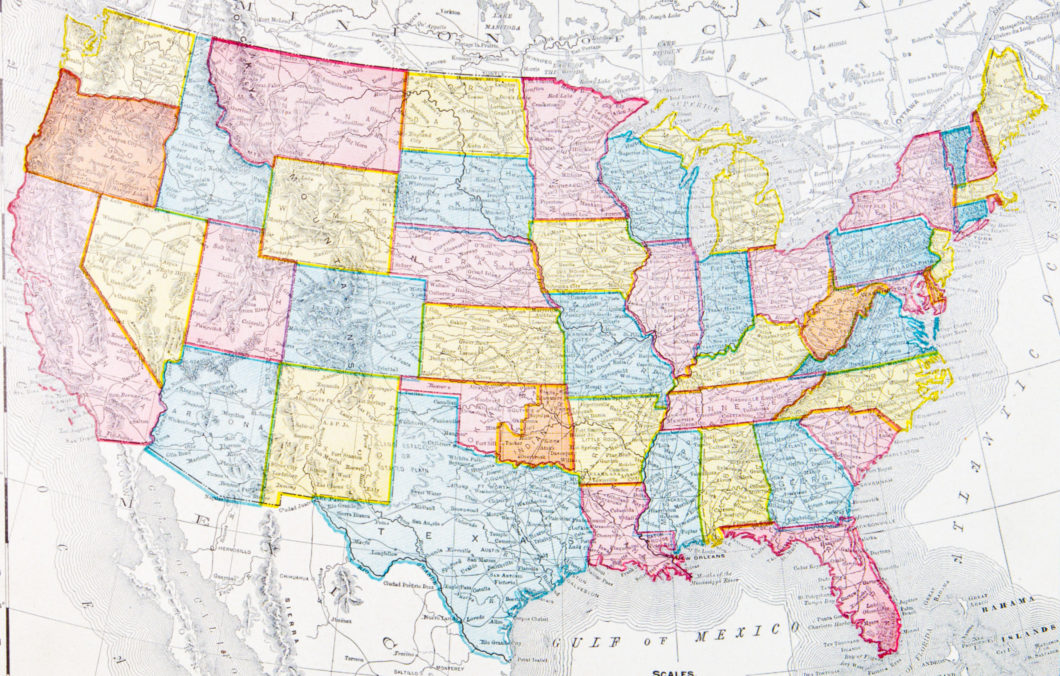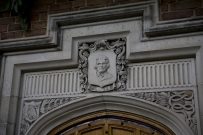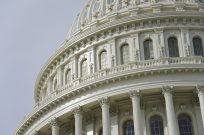A Beautiful but Mistaken History
As I finished reading a review copy of Colin Woodard’s Union: The Struggle to Forge the Story of United States Nationhood, I turned to my wife, somewhat befuddled, “What on God’s green earth did I just read?” With the convoluted title, I had assumed this would be a book along the lines of David Hackett Fisher’s Albion’s Seed, Alexis de Tocqueville’s Democracy in America, James Bryce’s The American Commonwealth, and Forrest McDonald’s States Rights and the Union. Union, though, turned out to be absolutely nothing like any of these books.
The book itself is rather massive, but its introduction (labeled a “Note From the Author”) is short and says very little about the meaning of the book, its intent, or its ultimate objective. The conclusion (labeled an “Epilogue”) is an extended rant against America’s failure to establish and maintain racial equality, and, in between, are seventy captivating chapters of fascinating narrative about intriguing figures of American history.
Let me state upfront that there was much to love about this book. Woodard knows how to write, and, sentence by sentence, paragraph by paragraph, and chapter by chapter, the author ceaselessly reveals his skills as a storyteller, as a wordsmith, and as a researcher. Taking the book as a whole, though, I remain confused as to its point and its purpose. To be sure, though, I very much enjoyed the ride. Indeed, from the moment I started the book, I couldn’t put it down, devouring it over just a few days. Woodard is a formidable and compelling author.
In his “Note From the Author,” he comes as close as he ever does in revealing the how and why of the structure of the book.
In Union I set out to write a book that would reveal how the story of a shared nationhood was devised, disseminated, and ultimately upheld. What I discovered in the course of my research was an intellectual battle of the highest possible stakes that spanned a century and ultimately helped explain a great deal about the age in which we now live. I have told this story through the lives of five people who made themselves standard-bearers as well as lightning rods in this struggle for the hearts and minds of millions.
The historical figures that Woodard chooses for his book are: George Bancroft; William Gilmoore Simms; Frederick Douglass; James Hammond; Abraham Lincoln; Frederick Jackson Turner; and Woodrow Wilson.
While Woodard tells absolutely fascinating stories about the characters of his book, he never explains why he focuses on these men as opposed to any others. I think I could make guesses as to why he chose these particular ones, but I could easily make counter narratives and offer different characters as well. The same book might have been written using Thomas Jefferson, James Fenimore Cooper, Joshua Chamberlain, Booker T. Washington, and Teddy Roosevelt. Or, the same book again might be written while employing John Adams, Crazy Lorenzo Dow, Edgar Allen Poe, Nat Turner, and E.A. Ross.
A related problem with the book is the title. I’m honestly not sure what this book should have been entitled, but I can state with certainty that the title chosen is the wrong one. This book has little to do with an understanding of union, republic, or nationhood. Indeed, Woodard’s title works only if union means either “white supremacy” or “racial equality.” If Union has to do with republican virtue, for example, then all is lost. If Union has to do with the liberties of the Bill of Rights, the restraints of the U.S. Constitution, or with independence from Great Britain, then all is still lost.
These are not the only confusing things within Woodard’s book, either. Whenever Woodard likes something, he labels it “liberal democratic.” Never, frustratingly, does he define either liberal or democratic, and he seems to be writing for an audience that automatically assumes liberal and democratic to be synonyms for the good and the true. When, however, Woodard does not like something, he labels it “conservative.” Thus, when describing the policies of those opposed to the Fourteenth and Fifteenth Amendments to the U.S. Constitution, he labels them “conservative.” Perhaps, he means “conservative” loosely, such as there were racists who wanted to “conserve” pre-Civil War racial relations. This poses a serious historical problem, though, as those who could be readily identified as actually conservative in the Gilded Age—such as E.L. Godkin or Henry Adams—were adamantly opposed to racial inequalities.
Progressivism, after all, is more a vision of history than it is an ideological ideal, and there can and have been left-wing as well as right-wing Progressives.
Even more bizarrely, when he describes the policies of arch-progressive Woodrow Wilson, he writes: “Wilson had the perfect profile, Harvey believed: a conservative Democrat who could mimic the language of the progressives, but had no experience or friends in politics.” In this way, Woodard can explain away Woodrow Wilson’s abhorrent racialist views as something other than Progressive.
That Wilson had refused to allow Bryan, an unrepentant progressive already known as the Great Commoner, to speak on Princeton’s campus during the 1908 campaign only reassured Harvey as to Wilson’s conservatism. “We now expect to see Woodrow Wilson elected Governor of the State of New Jersey in 1910 and nominated for President in 1912,” Harvey wrote in the May 1909 issue of Harper’s Weekly. All he needed was Wilson’s consent.
Woodard correctly despises Wilson for his unrepentant racism, but he refuses to see Wilson as a Progressive, thus keeping his own narrative somewhat pure (if tragically false). Wilson was, to be sure, the ultimate liberal democratic progressive of his day. “Progress!,” Wilson wrote in 1912. “We think of the future, not the past, as the more glorious time in comparison with which the present is nothing. Progress, development—those are modern words. The modern idea is to leave the past and press onward to something new.” For Wilson, the something new meant a pure Anglo-Saxon Protestant empire, diminishing the brown and black peoples of the world, the Jews, and the Catholics to mere nothingness. His constant opponents—such as Harvard’s Irving Babbitt and Princeton’s Paul Elmer More—were the true conservatives of the day, rightly opposed to the racism and eugenic longings of Wilson and his allied progressives.
By its very nature, as true conservatives well understand, Progressivism—which relies on the constant interplay and opposition of the thesis and anti-thesis—must always result in societal winners and societal losers, thus attenuating and possibly negating the common good (res publica). Progressivism, after all, is more a vision of history than it is an ideological ideal, and there can and have been left-wing as well as right-wing Progressives.
In his infamous “New Freedom” speech of 1912, Wilson explained the essence of his Progressive thought, emphasizing its historical as opposed to its political vision:
The trouble with the theory is that government is not a machine, but a living thing. It falls, not under the theory of the universe, but under the theory of organic life. It is accountable to Darwin, not to Newton. It is modified by its environment, necessitated by its tasks, shaped to its functions by the sheer pressure of life. No living thing can have its organs offset against each other, as checks, and live. On the contrary, its life is dependent upon their quick co-operation, their ready response to the commands of instinct or intelligence, their amicable community of purpose. Government is not a body of blind forces; it is a body of men, with highly differentiated functions, no doubt, in our modern day, of specialization, with a common task and purpose. Their co-operation is indispensable, their warfare fatal. There can be no successful government without the intimate, instinctive co-ordination of the organs of life and action. This is not theory, but fact, and displays its force as fact, whatever theories may be thrown across its track. Living political constitutions must be Darwinian in structure and in practice. Society is a living organism and must obey the laws of life, not of mechanics; it must develop.
For Wilson, as with all American progressives, the truth is an ever-moving target, one that decidedly moves away from habits, customs, and norms of the past. Had Woodard chosen to be less ideological about his approach to his subjects, Union would be of much greater import. Revealingly, none of the above from Wilson actually can be found in Woodard’s book. One has to search elsewhere to find Wilson’s true views. To be certain, though, Wilson cannot and should not be seen as a conservative, in any way, shape, or form.
As a series of stories (especially those about Frederick Douglass and Frederick Jackson Turner), Woodard’s Union is quite beautiful and, narratively, quite artistic. Yet, given its sins of omissions (and a few sins of commission), the book fails as a complete whole. Had the author provided even a few extra paragraphs explaining where he was going and why he was going there and had he defined his most important terms, he would have offered us a much stronger and more compelling work. I’m guessing that I still would disagree with Woodard’s underlying faith in the “liberal democratic” and progressivism as something healthy for non-white peoples or for society as a whole, but at least we could have had a good debate. As it is, Union leaves us with more questions than answers, and one will likely turn to one’s spouse and ask, “What on God’s green earth did I just read?” Union is, sadly, a mistake, but it is a beautiful one.


